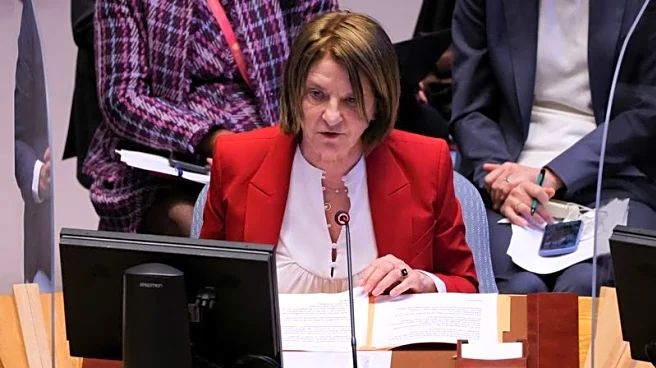What's Happening?
President Trump has introduced a peace proposal aimed at resolving the ongoing conflict in the Gaza Strip. The plan suggests that Gaza be governed by a temporary, technocratic Palestinian committee, with former British Prime Minister Tony Blair as a potential manager. The proposal requires Hamas to disarm and offers amnesty to those who commit to peaceful coexistence. It also includes the release of hostages and prisoners by both Israel and Hamas. Despite these measures, Hamas and the Palestinian Islamic Jihad have signaled their intention to reject the plan, citing that it ignores Palestinian interests. The plan also involves economic development initiatives and the establishment of an International Stabilization Force to maintain peace.
Why It's Important?
The proposal is significant as it represents a comprehensive attempt to address the long-standing conflict between Israel and Hamas. If successful, it could lead to a cessation of hostilities and pave the way for Palestinian self-determination and statehood. The involvement of international partners and the focus on economic development could stabilize the region and improve living conditions in Gaza. However, the rejection by Hamas highlights the challenges in achieving peace, as their cooperation is crucial for the plan's success. The proposal's emphasis on disarmament and governance changes could shift power dynamics in the region, affecting both local and international stakeholders.
What's Next?
The next steps involve diplomatic efforts to persuade Hamas and other stakeholders to accept the proposal. The U.S. and its allies may need to engage in further negotiations to address the concerns of Palestinian groups. The establishment of the International Stabilization Force and the implementation of economic development projects will depend on the acceptance of the plan. The international community, including countries like Egypt, Saudi Arabia, and Qatar, will play a crucial role in facilitating dialogue and supporting the peace process. Monitoring the response from both Israeli and Palestinian communities will be essential to gauge the plan's potential for success.
Beyond the Headlines
The proposal's success could lead to a significant shift in the geopolitical landscape of the Middle East. It may influence U.S. foreign policy and its relations with Arab nations. The plan's focus on deradicalization and education could have long-term cultural impacts, promoting coexistence and reducing extremism. However, the historical grievances and deep-seated mistrust between the parties pose significant challenges. The plan's economic aspects, involving President Trump's interests, may also raise ethical questions about the motivations behind the proposal.










